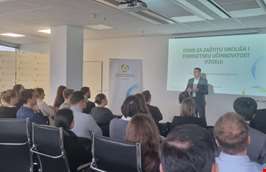01.12.2023.
Director of the Fund Luka Balen opened the panel “Green Economy - Entrepreneurial Challenges in Energy Transition” organised by Poslovni dnevnik magazine."Over the past 20 years, the Fund has implemented 50 thousand different projects. All these years we have been a vital partner to all those who were aware of the importance of environment protection even before the adoption of the European Green Deal, and we plan to continue doing so in the future. The Fund is currently implementing a call for co-financing photovoltaic power plants worth almost EUR 12.5 million. In the past 3 years, we have provided around 131 million euros of national funding for energy efficiency in buildings and the use of renewable energy sources. Together with the Ministry of Economy and Sustainable Development, and in addition to all existing EU programmes, we have initiated the allocation of resources from the Modernisation Fund for industry, including projects under the National Recovery and Resilience Plan and funds from the Solidarity Fund. These are very substantial funds being invested in the green transition and, so to speak, a better and more energy-independent future," said Director Balen.
For the second consecutive year, the work of companies that have recognised the competitive advantages of sustainable business has been closely monitored under the Green Economy project implemented by Poslovni dnevnik. This enlightening project emphasized the importance of green transition not only for Croatia, but for the European Union and the world in general.
Kristina Čelić, the director of the Directorate for Energy, said that the goal was to accelerate all activities related to the green and energy transition, which depends on the business community and above all the opportunities that are provided. "There have been market disruptions, and the lack of infrastructure has indicated weaknesses in the energy sector as well as infrastructure that is not sufficient to make these transitions towards a renewable green economy, while maintaining security of supply that is necessary to avoid other consequences such as unavailability of energy-generating products and national supplies that are not in the function of solidarity. These were activities that both Europe and Croatia had to tackle and organise in unexpected conditions," explained Čelić.
A panel discussion was held on the topic of "Financing sustainable projects". The panellists included deputy director of the Environmental Protection and Energy Efficiency Fund Mirko Budiša, mayor of Virovitica Ivica Kirin, director of the Energy Sector in Turbomehanika Igor Grozdanić, and assistant director for environmental protection, management systems and business services at Končar Goran Romac, who discussed how entrepreneurs could get financial support for sustainable projects, investment amounts, project preparation costs, financial benefits, and legal obligations related to ESG reporting.
"When we talk about companies, they are mainly interested in renewable energy programmes and energy efficient vehicles. We will welcome the new year with the announcement of a public call for incentivising renewable energy sources for legal entities worth 15 million euros. In addition to energy renovation and renewable energy sources programmes, local self-government units expressed a keen interest in the Smart City programme, which encourages sustainable and smart technological solutions for achieving sustainable development, and this public call worth 5 million euros will start in December," said Deputy Director of the Fund Mirko Budiša.
Director of the Energy Sector in Turbomehanika, Igor Grozdanić, said that in Croatia there were 428 municipalities and 127 towns, most of them troubled by unresolved property and legal relations that prevented, for example, the installation of a solar power plant on the roof. "So, the school has three owners - municipality, county and state, while the sports hall has not yet been entered in the spatial plan, so 120 kW is just sitting there unused," Grozdanić described.
Ivica Kirin, the mayor of Virovitica, commented that the green transition was mostly driven by the energy shock due to the war in Ukraine, forcing everyone to urgently think about reducing the huge costs. "We have installed five PV modules on the museum building, Pejačević Castle, hospital and Virkom building in an attempt to reduce the bills in this way."
Goran Romac from Končar said that his company was deeply engaged in the green and digital economy. "Končar has both green and digital at its core business and sees itself as a reliable partner in the European green transition," Romac said. He pointed out Končar's wind farm, which produces on average 25 million kWh of electricity annually.
"We shouldn’t forget that when we talk about Croatia in the global context, we must mention the war in Ukraine, energy prices and inflation, which have all put focus on energy independence, the state, and the economy. When we talk about entrepreneurs, their independence, in principle, corresponds to their competitiveness," Budiša concluded.
Photo by: Pixsell






